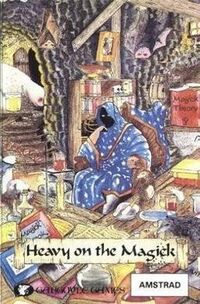Software:Heavy on the Magick
| Heavy on the Magick | |
|---|---|
 | |
| Developer(s) | Gargoyle Games[1] |
| Publisher(s) | Gargoyle Games[2] |
| Designer(s) | Greg Follis[3] Royston Carter[3] |
| Composer(s) | Mark Time |
| Platform(s) | ZX Spectrum, Amstrad CPC |
| Release | |
| Genre(s) | Adventure[1] |
| Mode(s) | Single-player[2] |
Heavy on the Magick is a video game for Amstrad CPC and ZX Spectrum published in 1986 by Gargoyle Games. The game's influences draw heavily from the occult, with the Master Therion in the plot below a reference to Aleister Crowley. To finish the game, the player must invoke numerous demons who are based on their "real" counterparts, e.g. Belezbar is based on Beelzebub.
Plot
This article needs a plot summary. (December 2020) |
Gameplay
The player controls the neophyte wizard Axil the Able and must help him escape from the dungeons below the castle of Colloden's Pile. This a keyboard-only game, and uses a set of commands (called "Merphish" in-game)[4] such as the standard north, south, east and west (N,S,E,W) and some additional unique commands such as invoke (I), freeze (f), and blast (b) which cast spells.[5] Conversations with certain friendly characters such as Apex the Ogre are initiated in the following syntax: "[character],[speech]" e.g. "Apex, thanks".
The dungeons are full of dangerous and hostile creatures such as wyverns, goblins and vampires. Axil can defend himself using magic to stall or kill these creatures. Not everyone in the dungeon is an enemy, some inhabitants (such as Apex the Ogre) are friendly unless provoked and can be conversed with.
The dungeon itself is separated into several distinct levels which Axil can travel to and from at will provided he can find the staircases up or down.
The game could be finished in three different ways, each way being of varying difficulty. The game was planned to be the first part of a trilogy, but the other games were never created.[2]
Reception
| Reception | ||||||||||||
|---|---|---|---|---|---|---|---|---|---|---|---|---|
| ||||||||||||
Reviews of the game were highly positive all round, with the only common criticism being the blocky graphics.{{citation needed|date=April 2018} e large animated graphics, the programmers scaled up single pixels to create all the sprites and foreground scenery in the game, effectively reducing the resolution of the graphics but compressing them in memory and so increasing the amount of space available for game content.[citation needed] The game won the award for best adventure game of the year in CRASH.[7] It was also runner-up in the Golden Joystick Awards.[8]
References
- ↑ 1.0 1.1 1.2 Heavy on the Magick information at GameFAQs
- ↑ 2.0 2.1 2.2 "Heavy on the Magick". https://spectrumcomputing.co.uk/index.php?cat=96&id=2274.
- ↑ 3.0 3.1 Hague, James (23 July 2025). "The Giant List of Classic Game Programmers". https://dadgum.com/giantlist/.
- ↑ https://worldofspectrum.org//pub/sinclair/games-info/h/HeavyOnTheMagick.txt [bare URL plain text file]
- ↑ "Heavy on the Magick | Retro Gamer". 19 February 2012. https://www.retrogamer.net/retro_games80/heavy-on-the-magick/.
- ↑ Game review, Amstrad June magazine, Future Publishing, issue 10, July 1986
- ↑ "CRASH 38 - Readers' Awards". http://www.crashonline.org.uk/38/awards.htm.
- ↑ "Computer & Video Games". http://www.worldofspectrum.org/showmag.cgi?mag=C+VG/Issue066/Pages/CVG06600101.jpg.
External links
 |
